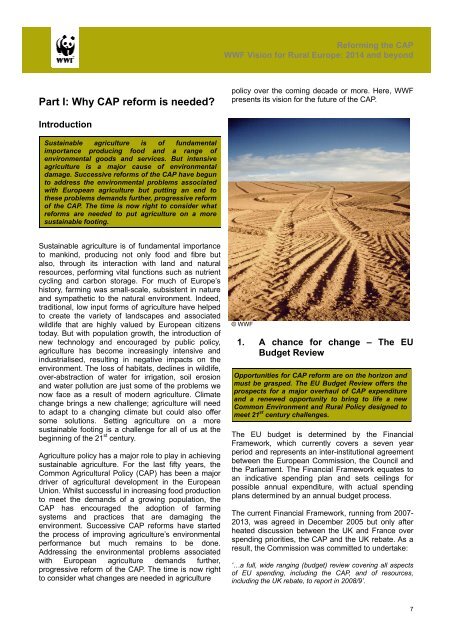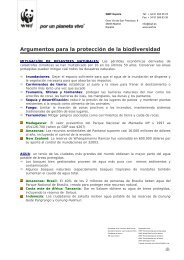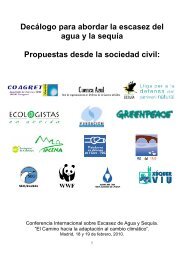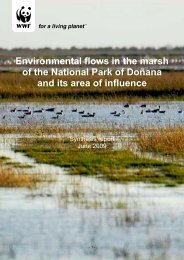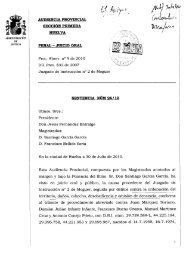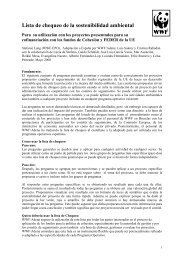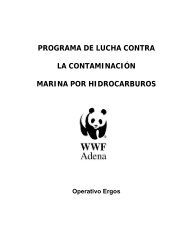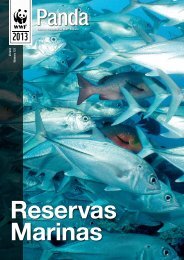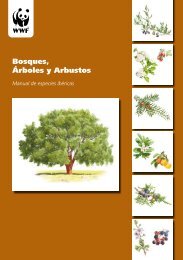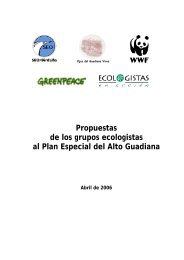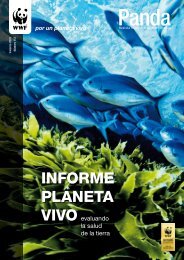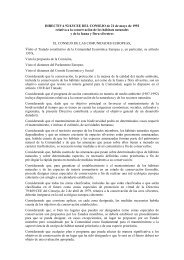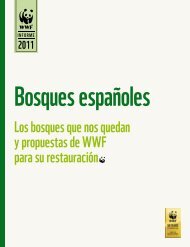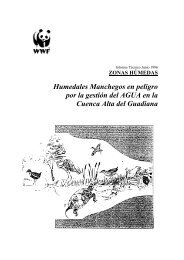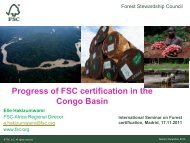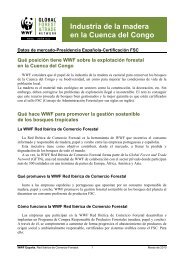Reforming the CAP WWF Vision for Rural Europe after 2013
Reforming the CAP WWF Vision for Rural Europe after 2013
Reforming the CAP WWF Vision for Rural Europe after 2013
You also want an ePaper? Increase the reach of your titles
YUMPU automatically turns print PDFs into web optimized ePapers that Google loves.
<strong>Re<strong>for</strong>ming</strong> <strong>the</strong> <strong>CAP</strong><br />
<strong>Re<strong>for</strong>ming</strong> <strong>the</strong> <strong>CAP</strong><br />
<strong>WWF</strong> <strong>Vision</strong> <strong>for</strong> <strong>Rural</strong> <strong>Europe</strong>: 2014 and beyond<br />
<strong>WWF</strong> <strong>Vision</strong> <strong>for</strong> <strong>Rural</strong> <strong>Europe</strong> <strong>after</strong> <strong>2013</strong><br />
Part I: Why <strong>CAP</strong> re<strong>for</strong>m is needed<br />
policy over <strong>the</strong> coming decade or more. Here, <strong>WWF</strong><br />
presents its vision <strong>for</strong> <strong>the</strong> future of <strong>the</strong> <strong>CAP</strong>.<br />
Introduction<br />
Sustainable agriculture is of fundamental<br />
importance producing food and a range of<br />
environmental goods and services. But intensive<br />
agriculture is a major cause of environmental<br />
damage. Successive re<strong>for</strong>ms of <strong>the</strong> <strong>CAP</strong> have begun<br />
to address <strong>the</strong> environmental problems associated<br />
with <strong>Europe</strong>an agriculture but putting an end to<br />
<strong>the</strong>se problems demands fur<strong>the</strong>r, progressive re<strong>for</strong>m<br />
of <strong>the</strong> <strong>CAP</strong>. The time is now right to consider what<br />
re<strong>for</strong>ms are needed to put agriculture on a more<br />
sustainable footing.<br />
Sustainable agriculture is of fundamental importance<br />
to mankind, producing not only food and fibre but<br />
also, through its interaction with land and natural<br />
resources, per<strong>for</strong>ming vital functions such as nutrient<br />
cycling and carbon storage. For much of <strong>Europe</strong>’s<br />
history, farming was small-scale, subsistent in nature<br />
and sympa<strong>the</strong>tic to <strong>the</strong> natural environment. Indeed,<br />
traditional, low input <strong>for</strong>ms of agriculture have helped<br />
to create <strong>the</strong> variety of landscapes and associated<br />
wildlife that are highly valued by <strong>Europe</strong>an citizens<br />
today. But with population growth, <strong>the</strong> introduction of<br />
new technology and encouraged by public policy,<br />
agriculture has become increasingly intensive and<br />
industrialised, resulting in negative impacts on <strong>the</strong><br />
environment. The loss of habitats, declines in wildlife,<br />
over-abstraction of water <strong>for</strong> irrigation, soil erosion<br />
and water pollution are just some of <strong>the</strong> problems we<br />
now face as a result of modern agriculture. Climate<br />
change brings a new challenge; agriculture will need<br />
to adapt to a changing climate but could also offer<br />
some solutions. Setting agriculture on a more<br />
sustainable footing is a challenge <strong>for</strong> all of us at <strong>the</strong><br />
beginning of <strong>the</strong> 21 st century.<br />
Agriculture policy has a major role to play in achieving<br />
sustainable agriculture. For <strong>the</strong> last fifty years, <strong>the</strong><br />
Common Agricultural Policy (<strong>CAP</strong>) has been a major<br />
driver of agricultural development in <strong>the</strong> <strong>Europe</strong>an<br />
Union. Whilst successful in increasing food production<br />
to meet <strong>the</strong> demands of a growing population, <strong>the</strong><br />
<strong>CAP</strong> has encouraged <strong>the</strong> adoption of farming<br />
systems and practices that are damaging <strong>the</strong><br />
environment. Successive <strong>CAP</strong> re<strong>for</strong>ms have started<br />
<strong>the</strong> process of improving agriculture’s environmental<br />
per<strong>for</strong>mance but much remains to be done.<br />
Addressing <strong>the</strong> environmental problems associated<br />
with <strong>Europe</strong>an agriculture demands fur<strong>the</strong>r,<br />
progressive re<strong>for</strong>m of <strong>the</strong> <strong>CAP</strong>. The time is now right<br />
to consider what changes are needed in agriculture<br />
© <strong>WWF</strong><br />
1. A chance <strong>for</strong> change – The EU<br />
Budget Review<br />
Opportunities <strong>for</strong> <strong>CAP</strong> re<strong>for</strong>m are on <strong>the</strong> horizon and<br />
must be grasped. The EU Budget Review offers <strong>the</strong><br />
prospects <strong>for</strong> a major overhaul of <strong>CAP</strong> expenditure<br />
and a renewed opportunity to bring to life a new<br />
Common Environment and <strong>Rural</strong> Policy designed to<br />
meet 21 st century challenges.<br />
The EU budget is determined by <strong>the</strong> Financial<br />
Framework, which currently covers a seven year<br />
period and represents an inter-institutional agreement<br />
between <strong>the</strong> <strong>Europe</strong>an Commission, <strong>the</strong> Council and<br />
<strong>the</strong> Parliament. The Financial Framework equates to<br />
an indicative spending plan and sets ceilings <strong>for</strong><br />
possible annual expenditure, with actual spending<br />
plans determined by an annual budget process.<br />
The current Financial Framework, running from 2007-<br />
<strong>2013</strong>, was agreed in December 2005 but only <strong>after</strong><br />
heated discussion between <strong>the</strong> UK and France over<br />
spending priorities, <strong>the</strong> <strong>CAP</strong> and <strong>the</strong> UK rebate. As a<br />
result, <strong>the</strong> Commission was committed to undertake:<br />
‘…a full, wide ranging (budget) review covering all aspects<br />
of EU spending, including <strong>the</strong> <strong>CAP</strong>, and of resources,<br />
including <strong>the</strong> UK rebate, to report in 2008/9’.<br />
7


